Sociology Paper: Reasons for the Split - Judaism vs. Christianity
VerifiedAdded on 2023/04/21
|9
|2244
|465
Essay
AI Summary
This sociology paper delves into the historical reasons behind the split between Judaism and Christianity. It begins by establishing their common roots in ancient Judaism and then explores the key factors that led to their divergence. The paper highlights the role of gentiles and the debate over circumcision, which caused significant tension. It also discusses the influence of the Romans, who persecuted Christians and sometimes aided in persecuting Jews, contributing to the separation. Furthermore, the essay analyzes the development of the early church as a distinct institution, including Paul's teachings and the concept of a spiritual temple, which clashed with some Jewish principles. The paper also examines the differing views on messianism, particularly the interpretation of Jesus' role. Ultimately, the paper concludes that despite their shared origins, Christianity and Judaism became distinct religions due to these theological, social, and political developments, with Paul's interpretations playing a crucial role in shaping the divide. This paper provides a comprehensive overview, supported by various scholarly sources, for understanding the historical context of the split and the lasting impact of these religious differences.
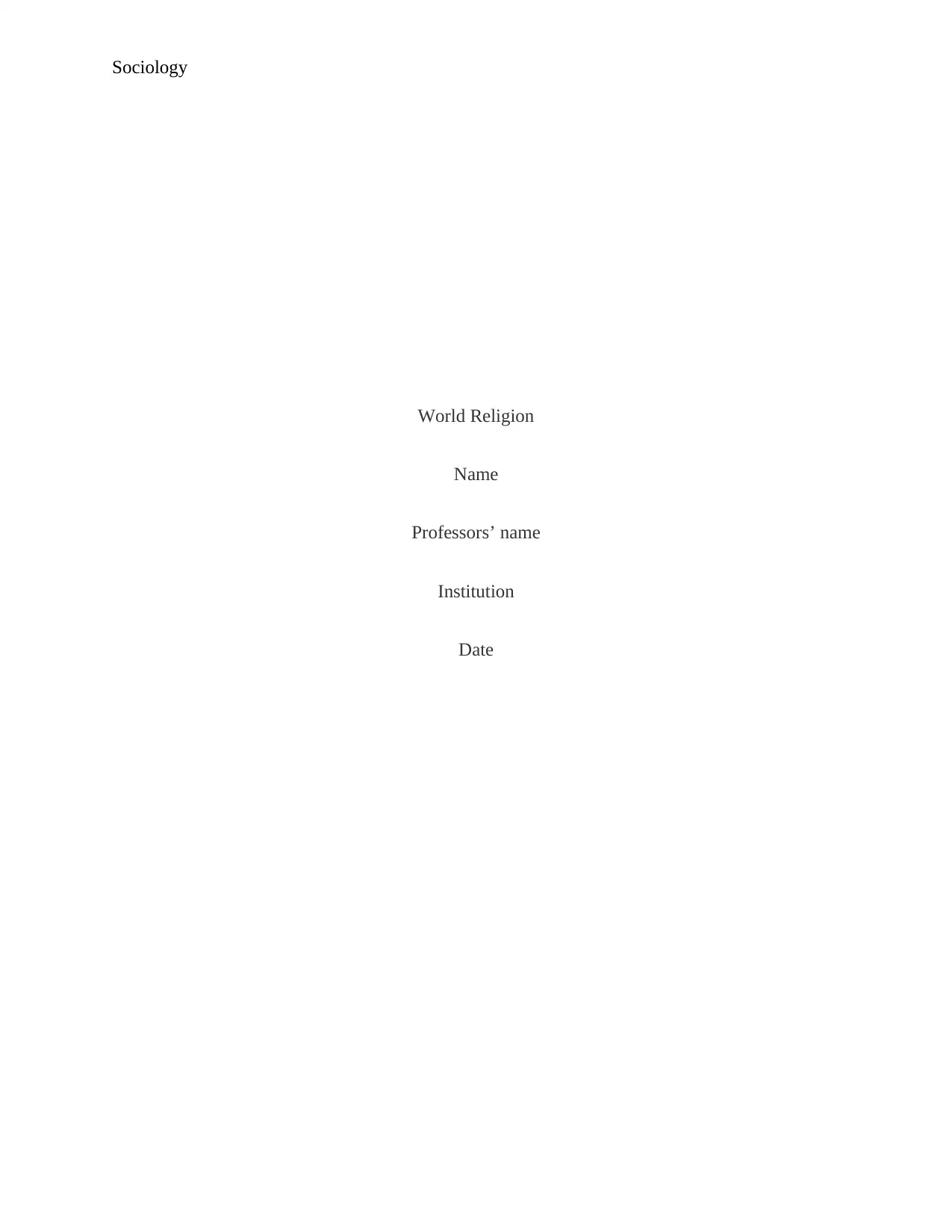
Sociology
World Religion
Name
Professors’ name
Institution
Date
World Religion
Name
Professors’ name
Institution
Date
Paraphrase This Document
Need a fresh take? Get an instant paraphrase of this document with our AI Paraphraser
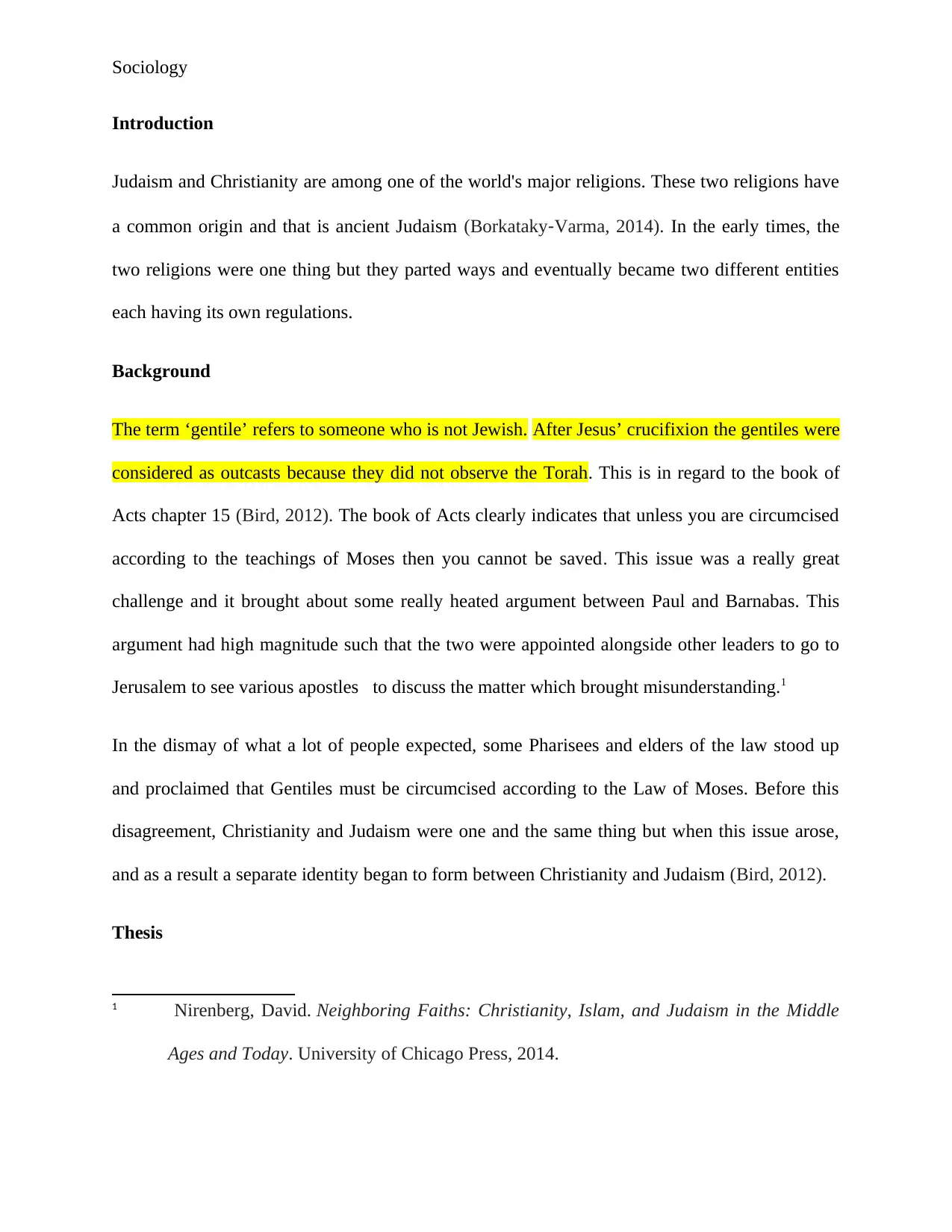
Sociology
Introduction
Judaism and Christianity are among one of the world's major religions. These two religions have
a common origin and that is ancient Judaism (Borkataky‐Varma, 2014). In the early times, the
two religions were one thing but they parted ways and eventually became two different entities
each having its own regulations.
Background
The term ‘gentile’ refers to someone who is not Jewish. After Jesus’ crucifixion the gentiles were
considered as outcasts because they did not observe the Torah. This is in regard to the book of
Acts chapter 15 (Bird, 2012). The book of Acts clearly indicates that unless you are circumcised
according to the teachings of Moses then you cannot be saved. This issue was a really great
challenge and it brought about some really heated argument between Paul and Barnabas. This
argument had high magnitude such that the two were appointed alongside other leaders to go to
Jerusalem to see various apostles to discuss the matter which brought misunderstanding.1
In the dismay of what a lot of people expected, some Pharisees and elders of the law stood up
and proclaimed that Gentiles must be circumcised according to the Law of Moses. Before this
disagreement, Christianity and Judaism were one and the same thing but when this issue arose,
and as a result a separate identity began to form between Christianity and Judaism (Bird, 2012).
Thesis
1 Nirenberg, David. Neighboring Faiths: Christianity, Islam, and Judaism in the Middle
Ages and Today. University of Chicago Press, 2014.
Introduction
Judaism and Christianity are among one of the world's major religions. These two religions have
a common origin and that is ancient Judaism (Borkataky‐Varma, 2014). In the early times, the
two religions were one thing but they parted ways and eventually became two different entities
each having its own regulations.
Background
The term ‘gentile’ refers to someone who is not Jewish. After Jesus’ crucifixion the gentiles were
considered as outcasts because they did not observe the Torah. This is in regard to the book of
Acts chapter 15 (Bird, 2012). The book of Acts clearly indicates that unless you are circumcised
according to the teachings of Moses then you cannot be saved. This issue was a really great
challenge and it brought about some really heated argument between Paul and Barnabas. This
argument had high magnitude such that the two were appointed alongside other leaders to go to
Jerusalem to see various apostles to discuss the matter which brought misunderstanding.1
In the dismay of what a lot of people expected, some Pharisees and elders of the law stood up
and proclaimed that Gentiles must be circumcised according to the Law of Moses. Before this
disagreement, Christianity and Judaism were one and the same thing but when this issue arose,
and as a result a separate identity began to form between Christianity and Judaism (Bird, 2012).
Thesis
1 Nirenberg, David. Neighboring Faiths: Christianity, Islam, and Judaism in the Middle
Ages and Today. University of Chicago Press, 2014.
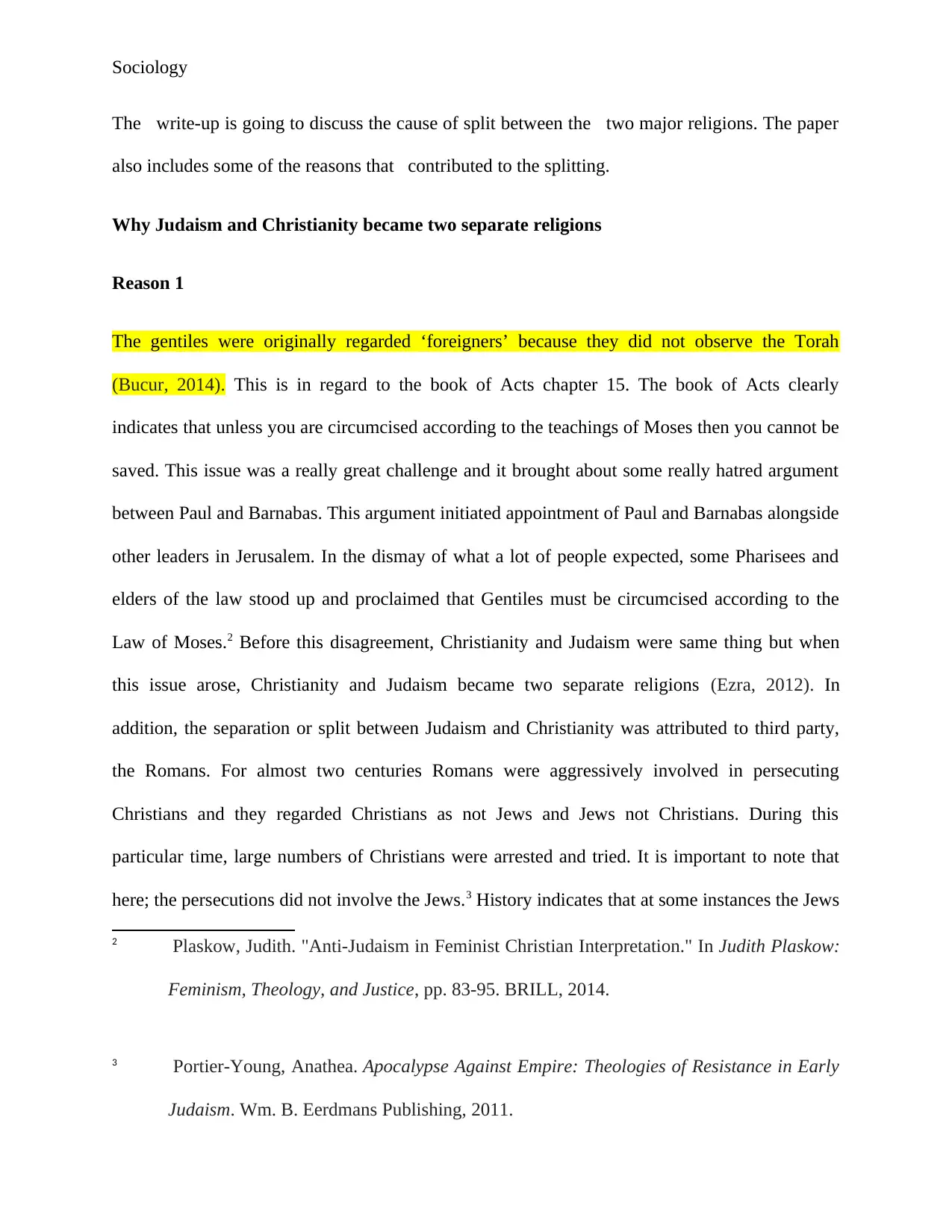
Sociology
The write-up is going to discuss the cause of split between the two major religions. The paper
also includes some of the reasons that contributed to the splitting.
Why Judaism and Christianity became two separate religions
Reason 1
The gentiles were originally regarded ‘foreigners’ because they did not observe the Torah
(Bucur, 2014). This is in regard to the book of Acts chapter 15. The book of Acts clearly
indicates that unless you are circumcised according to the teachings of Moses then you cannot be
saved. This issue was a really great challenge and it brought about some really hatred argument
between Paul and Barnabas. This argument initiated appointment of Paul and Barnabas alongside
other leaders in Jerusalem. In the dismay of what a lot of people expected, some Pharisees and
elders of the law stood up and proclaimed that Gentiles must be circumcised according to the
Law of Moses.2 Before this disagreement, Christianity and Judaism were same thing but when
this issue arose, Christianity and Judaism became two separate religions (Ezra, 2012). In
addition, the separation or split between Judaism and Christianity was attributed to third party,
the Romans. For almost two centuries Romans were aggressively involved in persecuting
Christians and they regarded Christians as not Jews and Jews not Christians. During this
particular time, large numbers of Christians were arrested and tried. It is important to note that
here; the persecutions did not involve the Jews.3 History indicates that at some instances the Jews
2 Plaskow, Judith. "Anti-Judaism in Feminist Christian Interpretation." In Judith Plaskow:
Feminism, Theology, and Justice, pp. 83-95. BRILL, 2014.
3 Portier-Young, Anathea. Apocalypse Against Empire: Theologies of Resistance in Early
Judaism. Wm. B. Eerdmans Publishing, 2011.
The write-up is going to discuss the cause of split between the two major religions. The paper
also includes some of the reasons that contributed to the splitting.
Why Judaism and Christianity became two separate religions
Reason 1
The gentiles were originally regarded ‘foreigners’ because they did not observe the Torah
(Bucur, 2014). This is in regard to the book of Acts chapter 15. The book of Acts clearly
indicates that unless you are circumcised according to the teachings of Moses then you cannot be
saved. This issue was a really great challenge and it brought about some really hatred argument
between Paul and Barnabas. This argument initiated appointment of Paul and Barnabas alongside
other leaders in Jerusalem. In the dismay of what a lot of people expected, some Pharisees and
elders of the law stood up and proclaimed that Gentiles must be circumcised according to the
Law of Moses.2 Before this disagreement, Christianity and Judaism were same thing but when
this issue arose, Christianity and Judaism became two separate religions (Ezra, 2012). In
addition, the separation or split between Judaism and Christianity was attributed to third party,
the Romans. For almost two centuries Romans were aggressively involved in persecuting
Christians and they regarded Christians as not Jews and Jews not Christians. During this
particular time, large numbers of Christians were arrested and tried. It is important to note that
here; the persecutions did not involve the Jews.3 History indicates that at some instances the Jews
2 Plaskow, Judith. "Anti-Judaism in Feminist Christian Interpretation." In Judith Plaskow:
Feminism, Theology, and Justice, pp. 83-95. BRILL, 2014.
3 Portier-Young, Anathea. Apocalypse Against Empire: Theologies of Resistance in Early
Judaism. Wm. B. Eerdmans Publishing, 2011.
⊘ This is a preview!⊘
Do you want full access?
Subscribe today to unlock all pages.

Trusted by 1+ million students worldwide
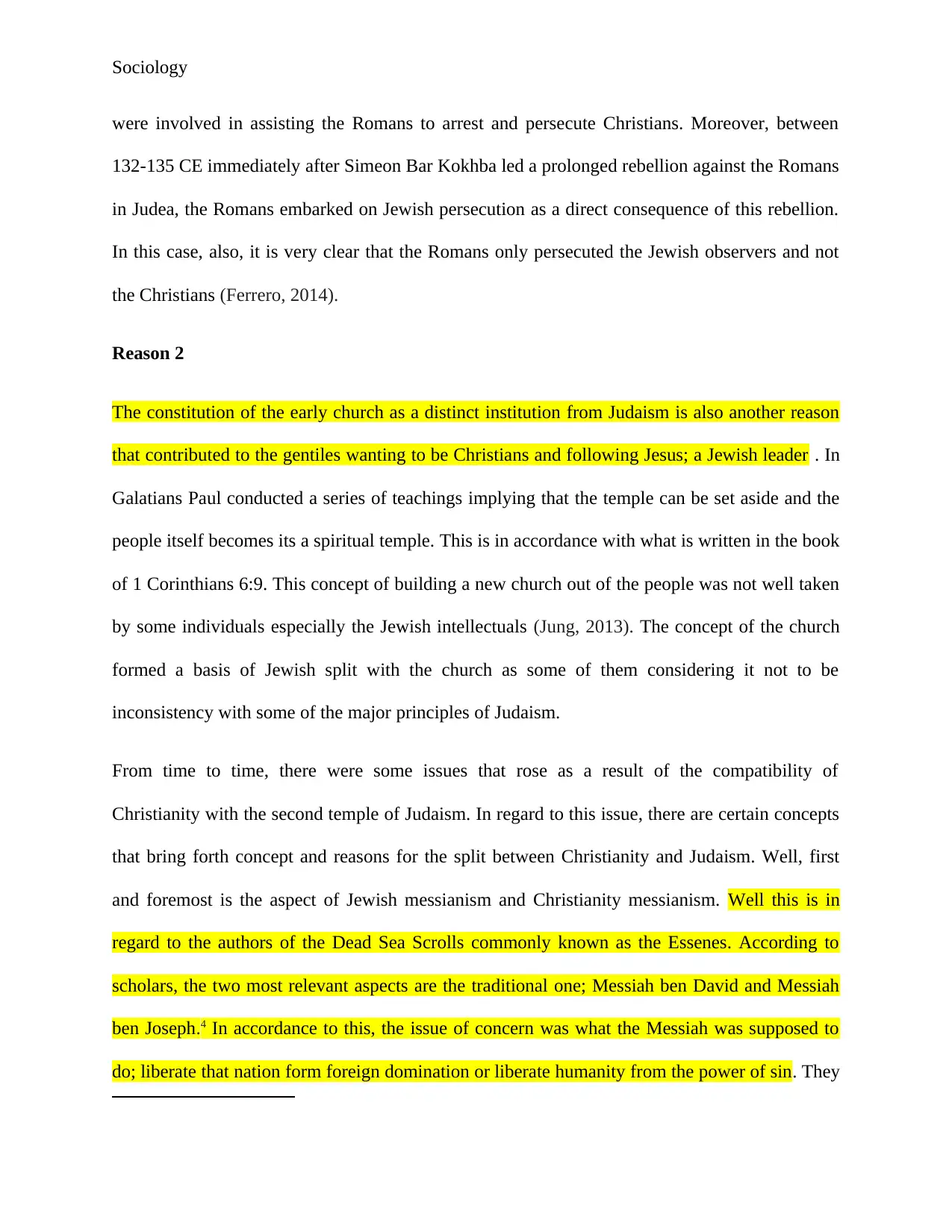
Sociology
were involved in assisting the Romans to arrest and persecute Christians. Moreover, between
132-135 CE immediately after Simeon Bar Kokhba led a prolonged rebellion against the Romans
in Judea, the Romans embarked on Jewish persecution as a direct consequence of this rebellion.
In this case, also, it is very clear that the Romans only persecuted the Jewish observers and not
the Christians (Ferrero, 2014).
Reason 2
The constitution of the early church as a distinct institution from Judaism is also another reason
that contributed to the gentiles wanting to be Christians and following Jesus; a Jewish leader . In
Galatians Paul conducted a series of teachings implying that the temple can be set aside and the
people itself becomes its a spiritual temple. This is in accordance with what is written in the book
of 1 Corinthians 6:9. This concept of building a new church out of the people was not well taken
by some individuals especially the Jewish intellectuals (Jung, 2013). The concept of the church
formed a basis of Jewish split with the church as some of them considering it not to be
inconsistency with some of the major principles of Judaism.
From time to time, there were some issues that rose as a result of the compatibility of
Christianity with the second temple of Judaism. In regard to this issue, there are certain concepts
that bring forth concept and reasons for the split between Christianity and Judaism. Well, first
and foremost is the aspect of Jewish messianism and Christianity messianism. Well this is in
regard to the authors of the Dead Sea Scrolls commonly known as the Essenes. According to
scholars, the two most relevant aspects are the traditional one; Messiah ben David and Messiah
ben Joseph.4 In accordance to this, the issue of concern was what the Messiah was supposed to
do; liberate that nation form foreign domination or liberate humanity from the power of sin. They
were involved in assisting the Romans to arrest and persecute Christians. Moreover, between
132-135 CE immediately after Simeon Bar Kokhba led a prolonged rebellion against the Romans
in Judea, the Romans embarked on Jewish persecution as a direct consequence of this rebellion.
In this case, also, it is very clear that the Romans only persecuted the Jewish observers and not
the Christians (Ferrero, 2014).
Reason 2
The constitution of the early church as a distinct institution from Judaism is also another reason
that contributed to the gentiles wanting to be Christians and following Jesus; a Jewish leader . In
Galatians Paul conducted a series of teachings implying that the temple can be set aside and the
people itself becomes its a spiritual temple. This is in accordance with what is written in the book
of 1 Corinthians 6:9. This concept of building a new church out of the people was not well taken
by some individuals especially the Jewish intellectuals (Jung, 2013). The concept of the church
formed a basis of Jewish split with the church as some of them considering it not to be
inconsistency with some of the major principles of Judaism.
From time to time, there were some issues that rose as a result of the compatibility of
Christianity with the second temple of Judaism. In regard to this issue, there are certain concepts
that bring forth concept and reasons for the split between Christianity and Judaism. Well, first
and foremost is the aspect of Jewish messianism and Christianity messianism. Well this is in
regard to the authors of the Dead Sea Scrolls commonly known as the Essenes. According to
scholars, the two most relevant aspects are the traditional one; Messiah ben David and Messiah
ben Joseph.4 In accordance to this, the issue of concern was what the Messiah was supposed to
do; liberate that nation form foreign domination or liberate humanity from the power of sin. They
Paraphrase This Document
Need a fresh take? Get an instant paraphrase of this document with our AI Paraphraser
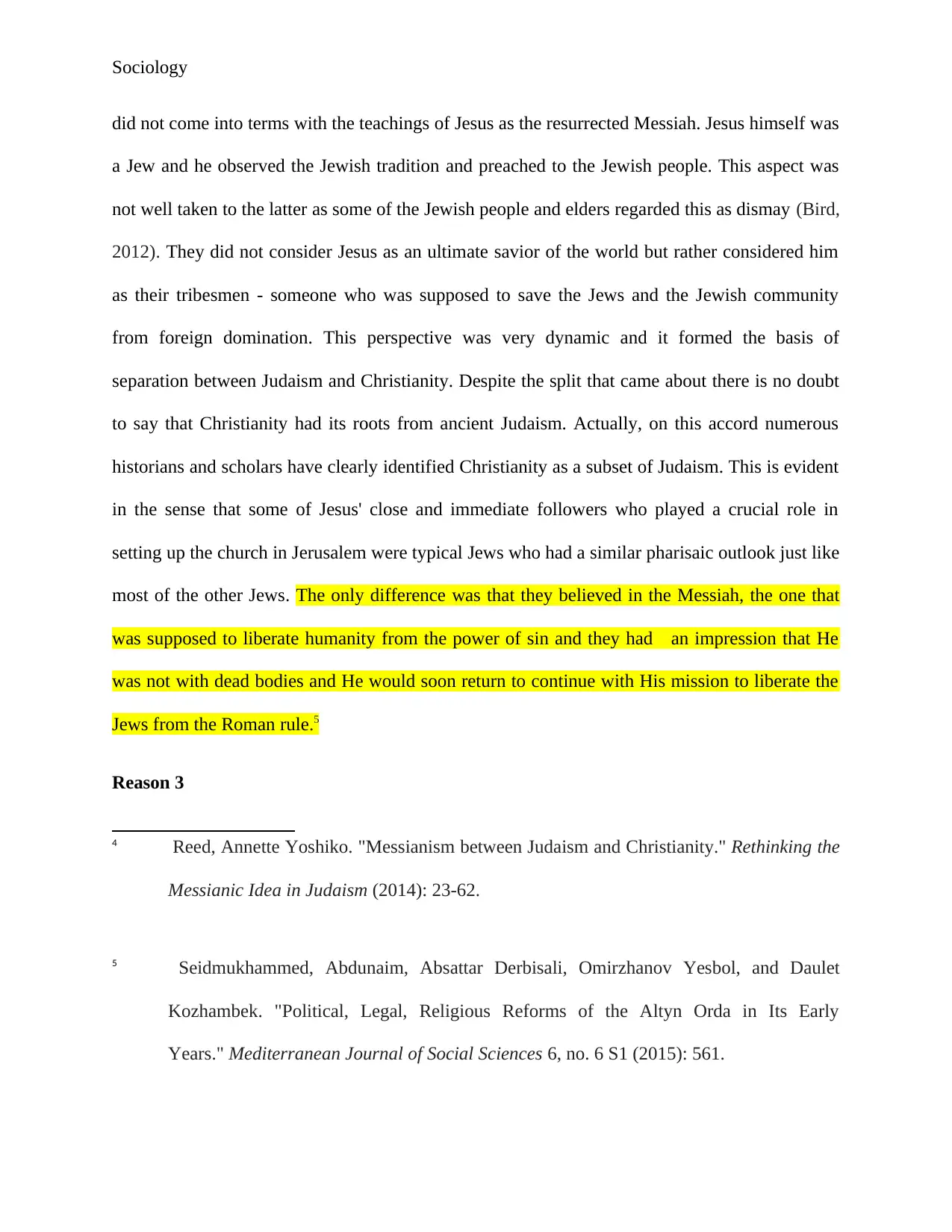
Sociology
did not come into terms with the teachings of Jesus as the resurrected Messiah. Jesus himself was
a Jew and he observed the Jewish tradition and preached to the Jewish people. This aspect was
not well taken to the latter as some of the Jewish people and elders regarded this as dismay (Bird,
2012). They did not consider Jesus as an ultimate savior of the world but rather considered him
as their tribesmen - someone who was supposed to save the Jews and the Jewish community
from foreign domination. This perspective was very dynamic and it formed the basis of
separation between Judaism and Christianity. Despite the split that came about there is no doubt
to say that Christianity had its roots from ancient Judaism. Actually, on this accord numerous
historians and scholars have clearly identified Christianity as a subset of Judaism. This is evident
in the sense that some of Jesus' close and immediate followers who played a crucial role in
setting up the church in Jerusalem were typical Jews who had a similar pharisaic outlook just like
most of the other Jews. The only difference was that they believed in the Messiah, the one that
was supposed to liberate humanity from the power of sin and they had an impression that He
was not with dead bodies and He would soon return to continue with His mission to liberate the
Jews from the Roman rule.5
Reason 3
4 Reed, Annette Yoshiko. "Messianism between Judaism and Christianity." Rethinking the
Messianic Idea in Judaism (2014): 23-62.
5 Seidmukhammed, Abdunaim, Absattar Derbisali, Omirzhanov Yesbol, and Daulet
Kozhambek. "Political, Legal, Religious Reforms of the Altyn Orda in Its Early
Years." Mediterranean Journal of Social Sciences 6, no. 6 S1 (2015): 561.
did not come into terms with the teachings of Jesus as the resurrected Messiah. Jesus himself was
a Jew and he observed the Jewish tradition and preached to the Jewish people. This aspect was
not well taken to the latter as some of the Jewish people and elders regarded this as dismay (Bird,
2012). They did not consider Jesus as an ultimate savior of the world but rather considered him
as their tribesmen - someone who was supposed to save the Jews and the Jewish community
from foreign domination. This perspective was very dynamic and it formed the basis of
separation between Judaism and Christianity. Despite the split that came about there is no doubt
to say that Christianity had its roots from ancient Judaism. Actually, on this accord numerous
historians and scholars have clearly identified Christianity as a subset of Judaism. This is evident
in the sense that some of Jesus' close and immediate followers who played a crucial role in
setting up the church in Jerusalem were typical Jews who had a similar pharisaic outlook just like
most of the other Jews. The only difference was that they believed in the Messiah, the one that
was supposed to liberate humanity from the power of sin and they had an impression that He
was not with dead bodies and He would soon return to continue with His mission to liberate the
Jews from the Roman rule.5
Reason 3
4 Reed, Annette Yoshiko. "Messianism between Judaism and Christianity." Rethinking the
Messianic Idea in Judaism (2014): 23-62.
5 Seidmukhammed, Abdunaim, Absattar Derbisali, Omirzhanov Yesbol, and Daulet
Kozhambek. "Political, Legal, Religious Reforms of the Altyn Orda in Its Early
Years." Mediterranean Journal of Social Sciences 6, no. 6 S1 (2015): 561.
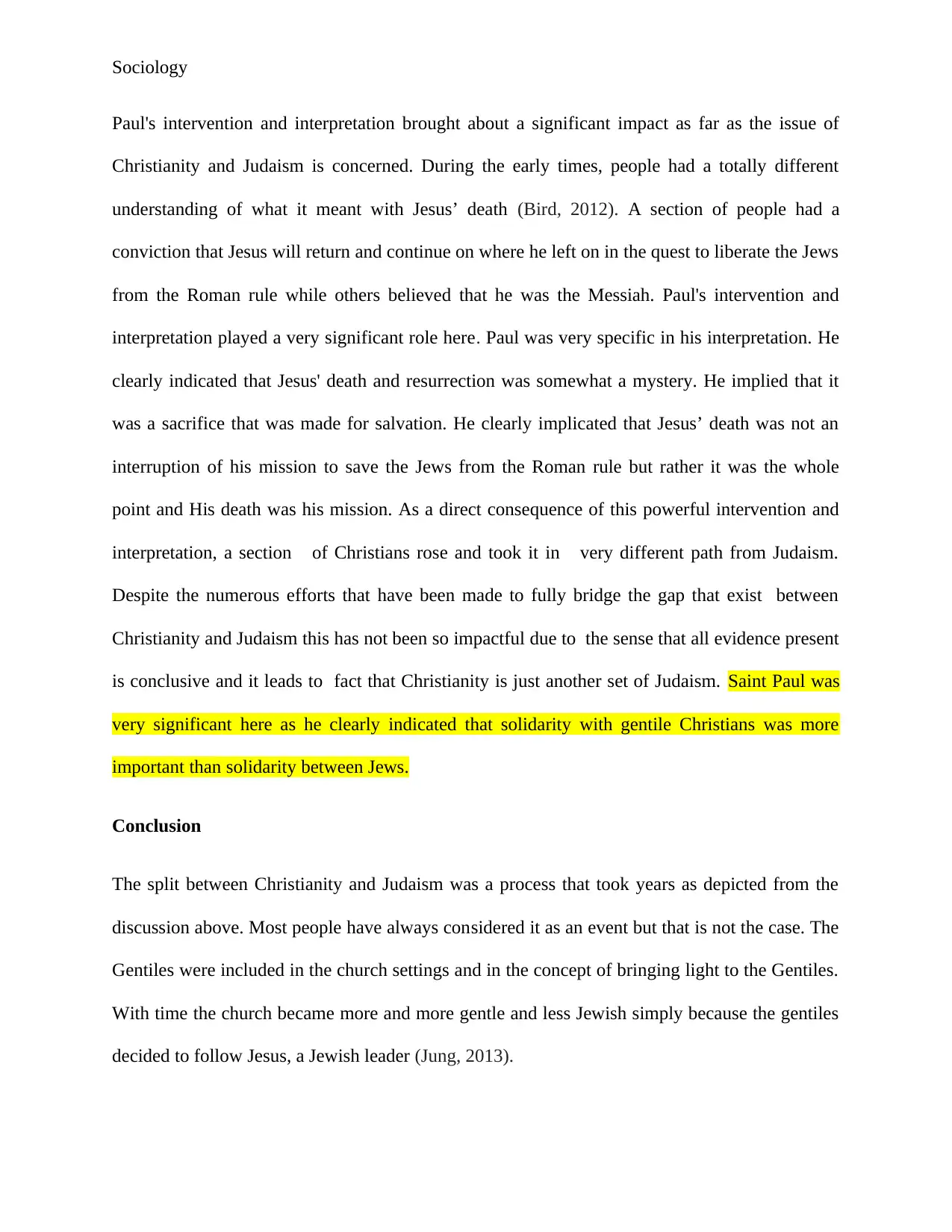
Sociology
Paul's intervention and interpretation brought about a significant impact as far as the issue of
Christianity and Judaism is concerned. During the early times, people had a totally different
understanding of what it meant with Jesus’ death (Bird, 2012). A section of people had a
conviction that Jesus will return and continue on where he left on in the quest to liberate the Jews
from the Roman rule while others believed that he was the Messiah. Paul's intervention and
interpretation played a very significant role here. Paul was very specific in his interpretation. He
clearly indicated that Jesus' death and resurrection was somewhat a mystery. He implied that it
was a sacrifice that was made for salvation. He clearly implicated that Jesus’ death was not an
interruption of his mission to save the Jews from the Roman rule but rather it was the whole
point and His death was his mission. As a direct consequence of this powerful intervention and
interpretation, a section of Christians rose and took it in very different path from Judaism.
Despite the numerous efforts that have been made to fully bridge the gap that exist between
Christianity and Judaism this has not been so impactful due to the sense that all evidence present
is conclusive and it leads to fact that Christianity is just another set of Judaism. Saint Paul was
very significant here as he clearly indicated that solidarity with gentile Christians was more
important than solidarity between Jews.
Conclusion
The split between Christianity and Judaism was a process that took years as depicted from the
discussion above. Most people have always considered it as an event but that is not the case. The
Gentiles were included in the church settings and in the concept of bringing light to the Gentiles.
With time the church became more and more gentle and less Jewish simply because the gentiles
decided to follow Jesus, a Jewish leader (Jung, 2013).
Paul's intervention and interpretation brought about a significant impact as far as the issue of
Christianity and Judaism is concerned. During the early times, people had a totally different
understanding of what it meant with Jesus’ death (Bird, 2012). A section of people had a
conviction that Jesus will return and continue on where he left on in the quest to liberate the Jews
from the Roman rule while others believed that he was the Messiah. Paul's intervention and
interpretation played a very significant role here. Paul was very specific in his interpretation. He
clearly indicated that Jesus' death and resurrection was somewhat a mystery. He implied that it
was a sacrifice that was made for salvation. He clearly implicated that Jesus’ death was not an
interruption of his mission to save the Jews from the Roman rule but rather it was the whole
point and His death was his mission. As a direct consequence of this powerful intervention and
interpretation, a section of Christians rose and took it in very different path from Judaism.
Despite the numerous efforts that have been made to fully bridge the gap that exist between
Christianity and Judaism this has not been so impactful due to the sense that all evidence present
is conclusive and it leads to fact that Christianity is just another set of Judaism. Saint Paul was
very significant here as he clearly indicated that solidarity with gentile Christians was more
important than solidarity between Jews.
Conclusion
The split between Christianity and Judaism was a process that took years as depicted from the
discussion above. Most people have always considered it as an event but that is not the case. The
Gentiles were included in the church settings and in the concept of bringing light to the Gentiles.
With time the church became more and more gentle and less Jewish simply because the gentiles
decided to follow Jesus, a Jewish leader (Jung, 2013).
⊘ This is a preview!⊘
Do you want full access?
Subscribe today to unlock all pages.

Trusted by 1+ million students worldwide
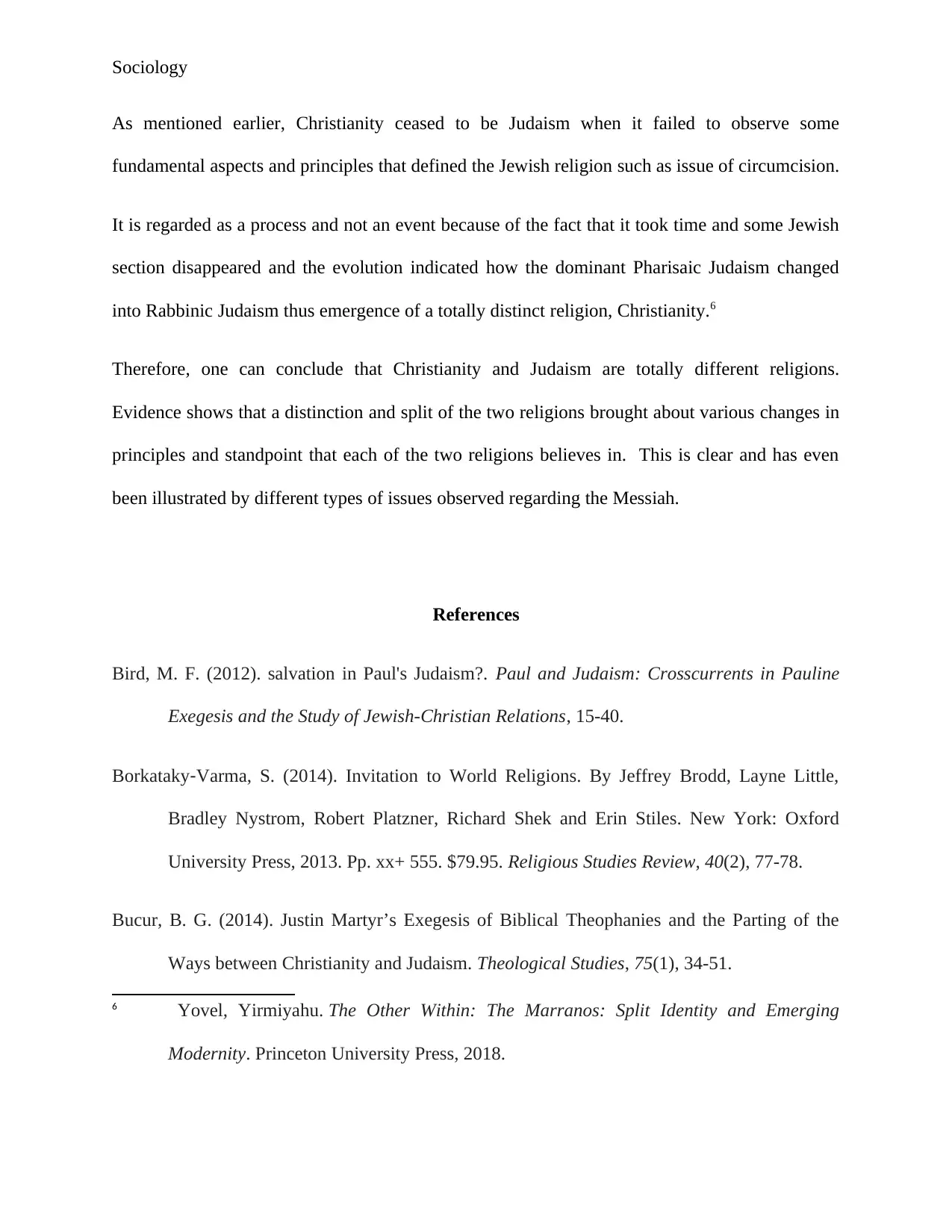
Sociology
As mentioned earlier, Christianity ceased to be Judaism when it failed to observe some
fundamental aspects and principles that defined the Jewish religion such as issue of circumcision.
It is regarded as a process and not an event because of the fact that it took time and some Jewish
section disappeared and the evolution indicated how the dominant Pharisaic Judaism changed
into Rabbinic Judaism thus emergence of a totally distinct religion, Christianity.6
Therefore, one can conclude that Christianity and Judaism are totally different religions.
Evidence shows that a distinction and split of the two religions brought about various changes in
principles and standpoint that each of the two religions believes in. This is clear and has even
been illustrated by different types of issues observed regarding the Messiah.
References
Bird, M. F. (2012). salvation in Paul's Judaism?. Paul and Judaism: Crosscurrents in Pauline
Exegesis and the Study of Jewish-Christian Relations, 15-40.
Borkataky‐Varma, S. (2014). Invitation to World Religions. By Jeffrey Brodd, Layne Little,
Bradley Nystrom, Robert Platzner, Richard Shek and Erin Stiles. New York: Oxford
University Press, 2013. Pp. xx+ 555. $79.95. Religious Studies Review, 40(2), 77-78.
Bucur, B. G. (2014). Justin Martyr’s Exegesis of Biblical Theophanies and the Parting of the
Ways between Christianity and Judaism. Theological Studies, 75(1), 34-51.
6 Yovel, Yirmiyahu. The Other Within: The Marranos: Split Identity and Emerging
Modernity. Princeton University Press, 2018.
As mentioned earlier, Christianity ceased to be Judaism when it failed to observe some
fundamental aspects and principles that defined the Jewish religion such as issue of circumcision.
It is regarded as a process and not an event because of the fact that it took time and some Jewish
section disappeared and the evolution indicated how the dominant Pharisaic Judaism changed
into Rabbinic Judaism thus emergence of a totally distinct religion, Christianity.6
Therefore, one can conclude that Christianity and Judaism are totally different religions.
Evidence shows that a distinction and split of the two religions brought about various changes in
principles and standpoint that each of the two religions believes in. This is clear and has even
been illustrated by different types of issues observed regarding the Messiah.
References
Bird, M. F. (2012). salvation in Paul's Judaism?. Paul and Judaism: Crosscurrents in Pauline
Exegesis and the Study of Jewish-Christian Relations, 15-40.
Borkataky‐Varma, S. (2014). Invitation to World Religions. By Jeffrey Brodd, Layne Little,
Bradley Nystrom, Robert Platzner, Richard Shek and Erin Stiles. New York: Oxford
University Press, 2013. Pp. xx+ 555. $79.95. Religious Studies Review, 40(2), 77-78.
Bucur, B. G. (2014). Justin Martyr’s Exegesis of Biblical Theophanies and the Parting of the
Ways between Christianity and Judaism. Theological Studies, 75(1), 34-51.
6 Yovel, Yirmiyahu. The Other Within: The Marranos: Split Identity and Emerging
Modernity. Princeton University Press, 2018.
Paraphrase This Document
Need a fresh take? Get an instant paraphrase of this document with our AI Paraphraser
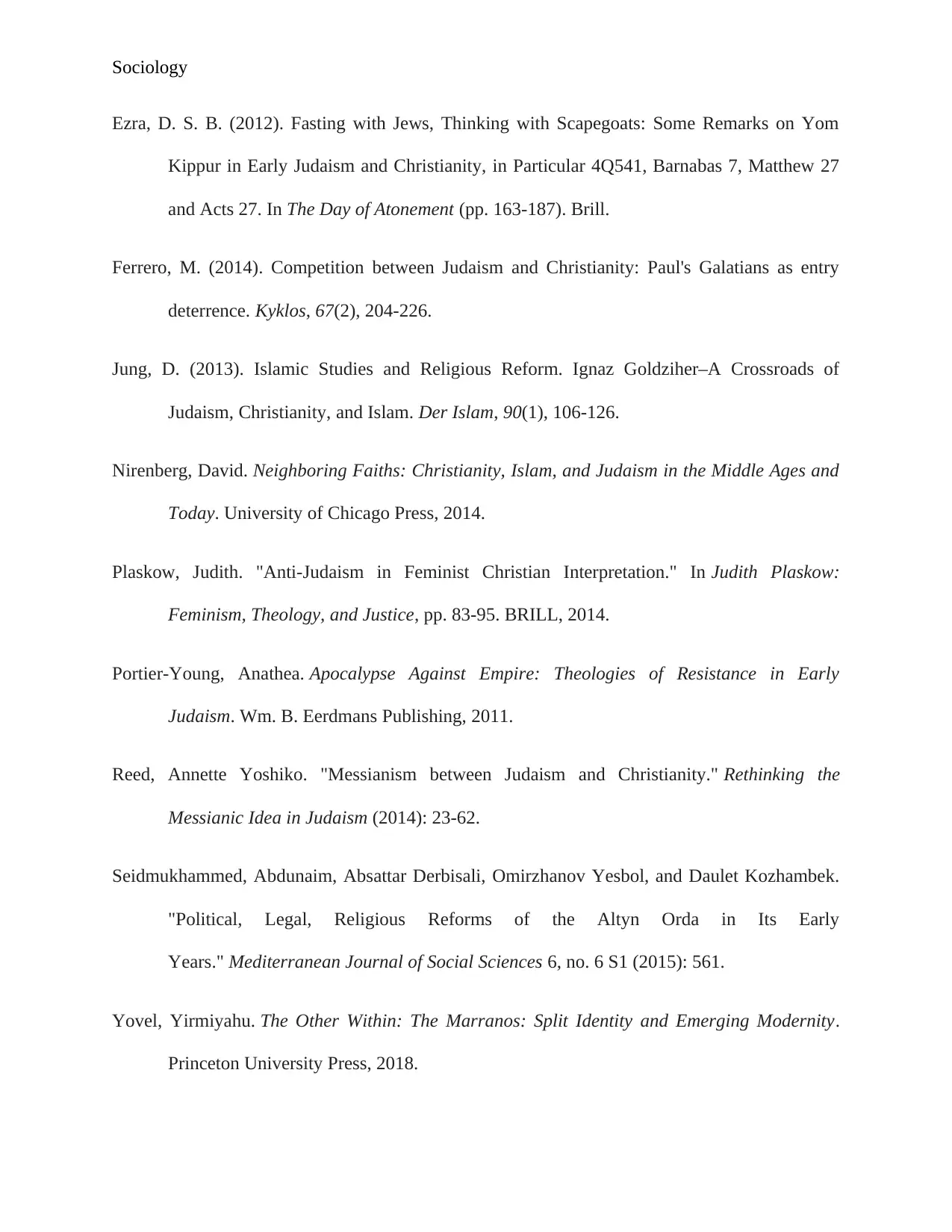
Sociology
Ezra, D. S. B. (2012). Fasting with Jews, Thinking with Scapegoats: Some Remarks on Yom
Kippur in Early Judaism and Christianity, in Particular 4Q541, Barnabas 7, Matthew 27
and Acts 27. In The Day of Atonement (pp. 163-187). Brill.
Ferrero, M. (2014). Competition between Judaism and Christianity: Paul's Galatians as entry
deterrence. Kyklos, 67(2), 204-226.
Jung, D. (2013). Islamic Studies and Religious Reform. Ignaz Goldziher–A Crossroads of
Judaism, Christianity, and Islam. Der Islam, 90(1), 106-126.
Nirenberg, David. Neighboring Faiths: Christianity, Islam, and Judaism in the Middle Ages and
Today. University of Chicago Press, 2014.
Plaskow, Judith. "Anti-Judaism in Feminist Christian Interpretation." In Judith Plaskow:
Feminism, Theology, and Justice, pp. 83-95. BRILL, 2014.
Portier-Young, Anathea. Apocalypse Against Empire: Theologies of Resistance in Early
Judaism. Wm. B. Eerdmans Publishing, 2011.
Reed, Annette Yoshiko. "Messianism between Judaism and Christianity." Rethinking the
Messianic Idea in Judaism (2014): 23-62.
Seidmukhammed, Abdunaim, Absattar Derbisali, Omirzhanov Yesbol, and Daulet Kozhambek.
"Political, Legal, Religious Reforms of the Altyn Orda in Its Early
Years." Mediterranean Journal of Social Sciences 6, no. 6 S1 (2015): 561.
Yovel, Yirmiyahu. The Other Within: The Marranos: Split Identity and Emerging Modernity.
Princeton University Press, 2018.
Ezra, D. S. B. (2012). Fasting with Jews, Thinking with Scapegoats: Some Remarks on Yom
Kippur in Early Judaism and Christianity, in Particular 4Q541, Barnabas 7, Matthew 27
and Acts 27. In The Day of Atonement (pp. 163-187). Brill.
Ferrero, M. (2014). Competition between Judaism and Christianity: Paul's Galatians as entry
deterrence. Kyklos, 67(2), 204-226.
Jung, D. (2013). Islamic Studies and Religious Reform. Ignaz Goldziher–A Crossroads of
Judaism, Christianity, and Islam. Der Islam, 90(1), 106-126.
Nirenberg, David. Neighboring Faiths: Christianity, Islam, and Judaism in the Middle Ages and
Today. University of Chicago Press, 2014.
Plaskow, Judith. "Anti-Judaism in Feminist Christian Interpretation." In Judith Plaskow:
Feminism, Theology, and Justice, pp. 83-95. BRILL, 2014.
Portier-Young, Anathea. Apocalypse Against Empire: Theologies of Resistance in Early
Judaism. Wm. B. Eerdmans Publishing, 2011.
Reed, Annette Yoshiko. "Messianism between Judaism and Christianity." Rethinking the
Messianic Idea in Judaism (2014): 23-62.
Seidmukhammed, Abdunaim, Absattar Derbisali, Omirzhanov Yesbol, and Daulet Kozhambek.
"Political, Legal, Religious Reforms of the Altyn Orda in Its Early
Years." Mediterranean Journal of Social Sciences 6, no. 6 S1 (2015): 561.
Yovel, Yirmiyahu. The Other Within: The Marranos: Split Identity and Emerging Modernity.
Princeton University Press, 2018.

Sociology
⊘ This is a preview!⊘
Do you want full access?
Subscribe today to unlock all pages.

Trusted by 1+ million students worldwide
1 out of 9
Your All-in-One AI-Powered Toolkit for Academic Success.
+13062052269
info@desklib.com
Available 24*7 on WhatsApp / Email
![[object Object]](/_next/static/media/star-bottom.7253800d.svg)
Unlock your academic potential
Copyright © 2020–2026 A2Z Services. All Rights Reserved. Developed and managed by ZUCOL.